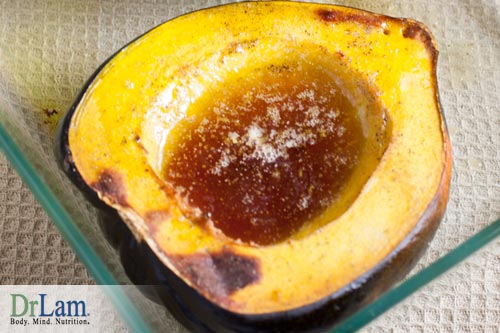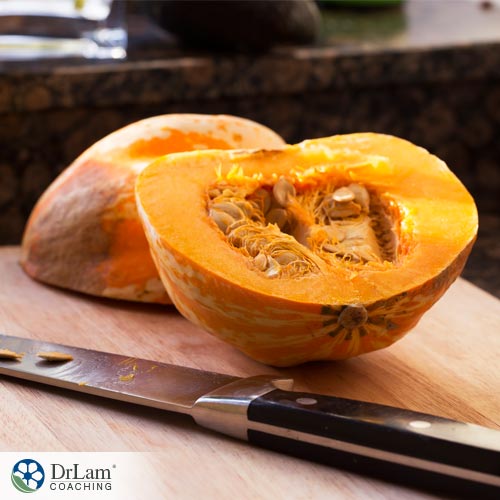
 Are you looking to enhance your meal plans and boost your immune system? Acorn squash could be the perfect addition to your dinner table. This orange-yellow vegetable is packed with antioxidants, omega-3 fatty acids, dietary fiber, vitamins, and minerals that could reduce your risk of developing several serious medical conditions. The mellow, sweet flavor of acorn squash means that it works well as a side dish to many entrees or you can eat it on its own for a nutritious snack. Cooking acorn squash is extremely simple and requires little to no additional ingredients.
Are you looking to enhance your meal plans and boost your immune system? Acorn squash could be the perfect addition to your dinner table. This orange-yellow vegetable is packed with antioxidants, omega-3 fatty acids, dietary fiber, vitamins, and minerals that could reduce your risk of developing several serious medical conditions. The mellow, sweet flavor of acorn squash means that it works well as a side dish to many entrees or you can eat it on its own for a nutritious snack. Cooking acorn squash is extremely simple and requires little to no additional ingredients.
Just half a cup of cooked acorn squash contains vitamin A, niacin, folate, thiamine, vitamin B6, and high levels of vitamin C. As a healthy adult, you can obtain around 20% of your recommended daily allowance (RDA) of vitamin C from acorn squash and this could boost your immune system and skeletal system health and help prevent hypertension, heart disease, cancer, and osteoarthritis.
You’ll find traces of iron, calcium, zinc, and phosphorus in acorn squash, but it’s the high levels of potassium and magnesium that are most beneficial. Each serving (½ cup) of acorn squash contains 11% of your RDA of magnesium and 13% of your potassium RDA, both of which work together to play a vital role in our health. Magnesium can strengthen your bones and teeth, boost your metabolism, and regulate potassium levels. Potassium maintains the water balance in your body and plays a vital role in muscle contractions. Eating foods high in potassium and magnesium is thought to reduce your risk of stroke, osteoporosis, depression, and diabetes.
You can find 18% of the recommended daily intake of fiber in each ½-cup serving of acorn squash, the majority of which is soluble. This type of fiber regulates the levels of glucose and cholesterol in your blood and also can help prevent diabetes, obesity, stroke, heart disease, and gastrointestinal disorders.
Winter squash varieties like acorn squash have been recognized as being the best sources of beta-carotene—an antioxidant that prevents damage to DNA and cells by fighting off free radicals. Eating foods high in antioxidants can lower your chance of developing cancer, diabetes, neurological disorders, and cardiovascular disease. Beta-carotene is also good for supporting your eyes and preventing vision loss.
 If you suffer from Adrenal Fatigue Syndrome (AFS), you may already be are aware of how important your diet is to your recovery. It’s important to be cautious about which foods and supplements you consume. In particular, starchy carbohydrates can lead to issues by causing an already exhausted AFS sufferer to experience additional unnecessary fatigue or adrenal crashes that could otherwise have been avoided.
If you suffer from Adrenal Fatigue Syndrome (AFS), you may already be are aware of how important your diet is to your recovery. It’s important to be cautious about which foods and supplements you consume. In particular, starchy carbohydrates can lead to issues by causing an already exhausted AFS sufferer to experience additional unnecessary fatigue or adrenal crashes that could otherwise have been avoided.
Carbs have a bad reputation, but not all carbs are equal and some don’t deserve it. Unless you’re following a ketogenic diet—less than 50 grams of carbohydrates per day—adding acorn squash to your diet should be fine and may be beneficial, even if you suffer from adrenal fatigue. In any case, it’s important to be extremely cautious with your diet and only consume the healthiest of foods. Often, the sugars in starchy carbs are absorbed by your system too quickly which can cause spikes in your blood sugar levels and additional fatigue. Although acorn squash is a carbohydrate, it’s a far cry from the refined starchy carbs that should be avoided, such as white bread and other white flour products, pasta, and rice.
The vitamin content of acorn squash can be degraded by exposure to air, light, heat, and water. To maximize the nutrient content, it's best to use acorn squash within 4 days of buying it. Also, only cut it right before you plan to cook it, then steam or bake it to retain all the vitamins that could escape if you boiled it in water.
It’s always best to use organic ingredients as much as possible. Organic products usually have a higher concentration of nutrients and fewer toxins, which is extremely important to optimal health and to aid in recovery from disorders such as AFS.
Acorn squash and other winter squash are higher in sugar content, so you will want to limit the amount you consume. If you have diabetes or are simply looking for a sugar alternative, substituting with Stevia is a healthy choice. However, the amounts of sugar and Stevia you will use are quite different. Use the following conversions:
There are many benefits of using Stevia to replace sugar. First, Stevia has been shown to help control blood sugar and insulin levels. In one such study, Stevia plant extract—known as stevioside—was shown to reduce the after-meal blood glucose levels of participants with type 2 diabetics by an average of 18 percent. In comparison to sugar, consuming Stevia prior to meals resulted in far lower post-meal glucose and insulin levels. In another recent study, Stevia was shown to lower blood pressure. In the placebo-controlled double-blinded study, oral stevioside led to a lasting decrease in both systolic and diastolic blood pressure when taken three times a day for one year. No side effects were observed and stevioside was extremely well-tolerated by all patients.
You may also want to try baking with sweeter types of squash such as butternut, blue Hubbard, or red kabocha. You might not need to add any sweetener at all.
 To become proactive about your health and AFS recovery, you’ll need to ensure you’re getting good nutrition along with regular exercise and a healthy mind-body balance. The human body conducts energy which constantly flows through the body. When this energy is disturbed by something as simple as poor nutrition, your body can become unbalanced and you can develop any number of illnesses. Balancing your body’s energy systems through eating right, grounding, exercising, and having a positive mindset will provide your NeuroEndoMetabolic (NEM) stress response system with the tools it needs to function optimally. Moreover, consuming foods like acorn squash as part of a healthy adrenal fatigue diet will provide your body with the important nutrients it needs.
To become proactive about your health and AFS recovery, you’ll need to ensure you’re getting good nutrition along with regular exercise and a healthy mind-body balance. The human body conducts energy which constantly flows through the body. When this energy is disturbed by something as simple as poor nutrition, your body can become unbalanced and you can develop any number of illnesses. Balancing your body’s energy systems through eating right, grounding, exercising, and having a positive mindset will provide your NeuroEndoMetabolic (NEM) stress response system with the tools it needs to function optimally. Moreover, consuming foods like acorn squash as part of a healthy adrenal fatigue diet will provide your body with the important nutrients it needs.
If you have AFS or another chronic illness, it’s always important to consult with your healthcare practitioner before starting a new diet or introducing new foods into your regime. Many people suffering from adrenal fatigue experience sensitivities to foods they once tolerated and were able to digest. The symptoms of an allergic reaction to acorn squash can include asthma, swelling of the mouth, tongue, or lips, and a red rash. Diarrhea and vomiting have also been reported. If you experience any of these symptoms after consuming acorn squash, stop eating it immediately and contact your healthcare provider.
© Copyright 2012-2019 Michael Lam, M.D. All Rights Reserved.
Although acorn squash is a starchy vegetable with a high carbohydrate content, it is not one to avoid. It’s loaded with beta-carotene, fiber, and a wide range of vitamins and minerals. It will not cause sugar spikes or fatigue.

